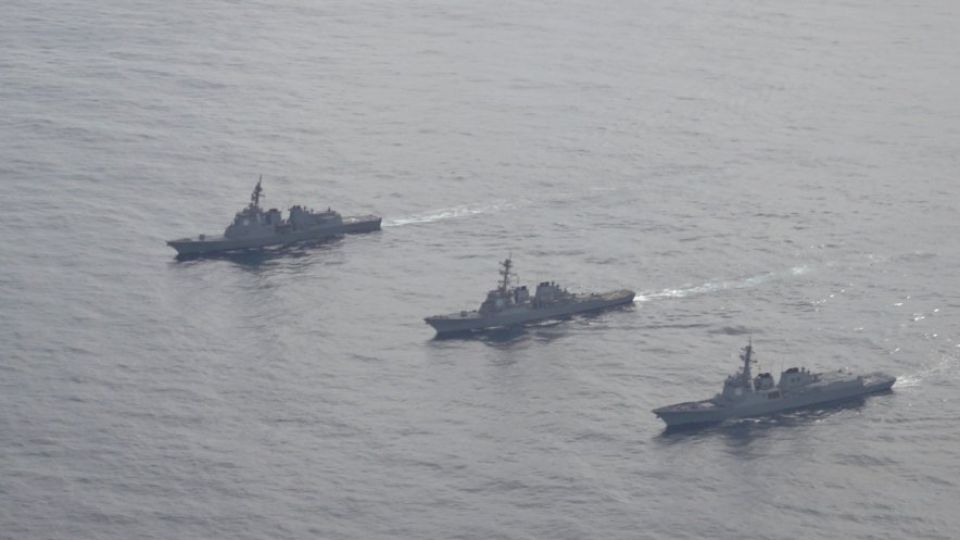February 23, 2023
SEOUL – South Korea, the United States and Japan staged a ballistic missile defense exercise on Wednesday in international waters to enhance military interoperability and readiness against escalating threats from North Korea, South Korea’s Joint Chiefs of Staff said.
The five-hour trilateral drills came days after North Korea fired two short-range ballistic missiles and one intercontinental ballistic missile, respectively, on Monday and Feb. 18.
The navies of the three countries “focused on mastering the procedures of detecting, tracking and intercepting incoming ballistic missile targets and shared information on the projectiles,” the JCS said.
“South Korea, the US and Japan have strengthened security cooperation and the counter-missile system by conducting the maritime missile defense exercise.”
The trilateral missile defense exercise was the first of their kind since October 2022, which was staged two days after Pyongyang fired an intermediate-range ballistic missile over Japan for the first time in five years.
South Korean Navy destroyer Sejong the Great, the guided-missile destroyer USS Barry of the US Navy and Japan Maritime Self-Defense Force’s Atago-class guided-missile destroyer JS Ashigara participated in the drills.
The destroyers of South Korea and Japan practiced detecting and tracking a virtual incoming ballistic missile and sharing information through the US destroyer as a hub. The USS Barry simulated bringing down the target, military officials said during a closed-door briefing.
The live-fire drills designed to practice intercepting the dummy projectiles with guided missiles were not part of Wednesday’s missile defense drills, unlike the multilateral Pacific Dragon exercise conducted in August 2022 in Hawaii and off the coast of Kauai.
During the briefing, the JCS was asked by local media whether it was appropriate to stage the trilateral exercise around 180 kilometers east of the Dokdo islets on Takeshima Day, the day Japan annually celebrates its claim to the Dokdo islets.
In response, a JCS official who asked to remain anonymous said the three countries agreed to stage the drills on the day “in light of urgency.”
There was a difference among how the three countries specified the location of the exercise. South Korea’s JCS said it was staged in international waters and outside of the Korean Theater of Operations. In contrast, the US Indo-Pacific Command and the Japanese Joint Staff said the drills were conducted in the “Sea of Japan.”
The navy commanders of South Korea, the US and Japan also held a virtual meeting on Wednesday to talk over how to reinforce the trilateral security cooperation and their readiness posture against mounting North Korean threats, the South Korean Navy said in a separate statement.
South Korea’s Naval Operations Commander Vice Adm. Kim Myung-soo, Vice Adm. Karl Thomas, commander of the US 7th Fleet and Japan’s Commander-in-Chief of the Self-Defense Fleet Vice Adm. Akira Saito participated in the meeting.
The three “discussed ways to stage trilateral exercises designed to prepare for North Korean missile provocations and other pending issues, including strengthening information sharing on maritime operations,” according to the navy.
The commanders also “strongly condemned North Korea’s recent missile launches as grave provocations that undermine the peace and stability on the Korean Peninsula and of the international community.”
Kim and Thomas also separately held in-person talks at the 7th Fleet based in Yokosuka, Japan, and discussed ways to reinforce information sharing when staging maritime operations and to enhance security cooperation and exchanges among navies in the region. One of the top agenda items discussed was how to better stage combined military exercises this year.
South Korea and the US were also set to stage a tabletop exercise, or TTX, at the Pentagon in Washington DC on Wednesday (local time) to develop a joint strategy and response to North Korea’s potential use of nuclear weapons and escalating nuclear threats.
The TTX — staged for the first time since September 2021 — holds significance this time as US and South Korean officials would specifically seek their optimal policy and military options in case of North Korea’s use of nuclear weapons.
Both sides would also discuss detailed, multistage procedures including information sharing on North Korean threats and consultation process to enhance the viability of US extended deterrence. Extended deterrence is the US’ commitment to deter or respond to coercion and external attacks on US allies and partners with the full range of its military capabilities, including nuclear weapons.
Seoul and Washington will announce the outcome of the DSC TTX, which will be reflected in the Tailored Deterrence Strategy that has not been updated since the allies first signed on in 2013. The allies have committed to completing updating and revising the strategic guideline on their deterrence and response by this year to better prepare for escalating nuclear and missile threats from North Korea.


